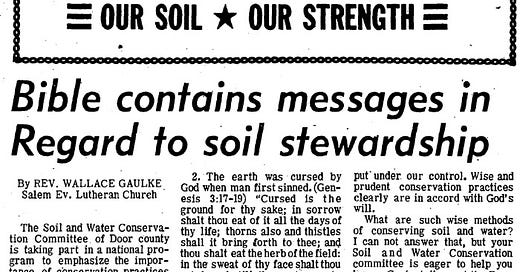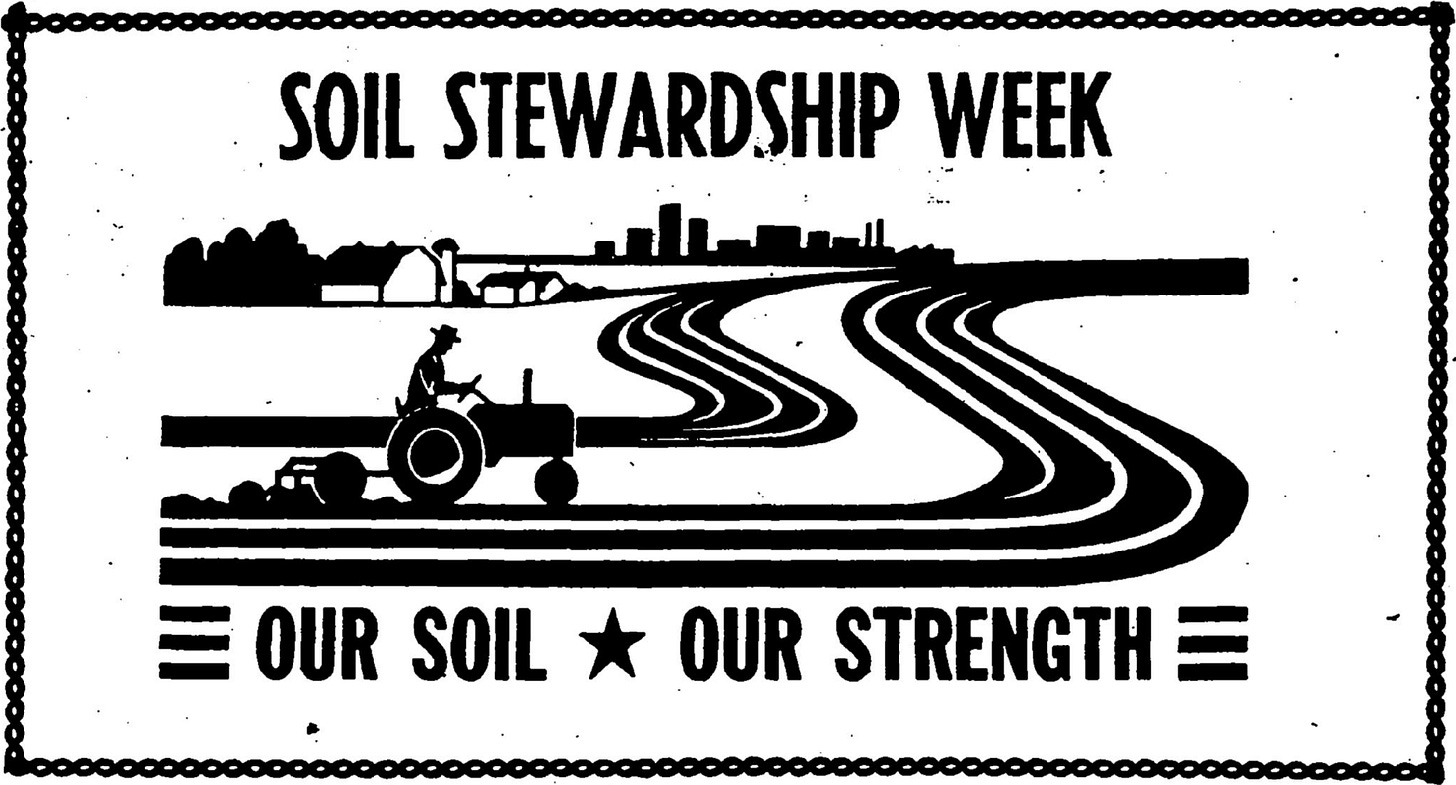“Bible contains messages in Regard to soil stewardship” from the May 4, 1967 Door County Advocate
Bible contains messages in Regard to soil stewardship
By REV. WALLACE GAULKE
Salem Ev. Lutheran Church
The Soil and Water Conservation Committee of Door county is taking part in a national program to emphasize the importance of conservation practices during the fifth week after Easter. The reason this particular week was chosen is that it follows Rogate, prayer, Sunday in the regular Church year. It was customary in old times to pray especially for a blessing upon the seed being sown in the earth about this time of the year. So it is that the committee has adopted the practice of incorporating theology in its appeal for sound conservation practices. So I was asked to show just what God has to say to us about the intelligent use of soil and water resources.
God’s will in this matter must be found in the Holy Scriptures, for as the Apostle Paul states, “All Scripture is given by inspiration of God, and is profitable for doctrine, for reproof, for correction, for instruction in righteousness.” So I intend to let the Bible speak for God, not myself. God, in the Bible, has the following to say about our stewardship of His gifts, of soil, water, and all natural resources:
1. To man was given the duty of taking care of all the earth. (Genesis 1:27-28) “So God created man in his own image, in the image of God created he him; male and female created he them. And God blessed them, and God said unto them, Be fruitful, and multiply, and replenish the earth, and subdue it: and have dominion over the fish of the sea, and over the fowl of the air, and over every living thing that moveth upon the earth.”
2. The earth was cursed by God when man first sinned. (Genesis 3:17-19) “Cursed is the ground for thy sake; in sorrow shalt thou eat of it all the days of thy life; thorns also and thistles shall it bring forth to thee; and thou shalt eat the herb of the field: in the sweat of thy face shalt thou eat bread, till thou return unto the ground; for out of it wast thou taken: for dust thou art, and unto dust shalt thou return.”
3. Christ made peace between God and the world. (2nd Corinthians 5:19) “God was in Christ, reconciling the world unto himself, not imputing their trespasses unto them; and hath committed unto us the word of reconciliation.”
4. Nature still suffers from the first sin. (Romans 8:22) “We know that the whole creation groaneth and travaileth in pain together until now.”
5. God commends wise stewardship of His gifts. (Matthew 25:21) “Well done, thou good and faithful servant thou hast been faithful over a few things, I will make thee ruler over many things: enter thou into the joy of thy lord.”
6. God rejects foolish stewardship of His gifts. (Matthew 25:30) “Cast ye the unprofitable servant into outer darkness: there shall be weeping and gnashing of teeth.”
7. Mankind must make do with the world as it is; it will not improve, but will be destroyed by God and replaced by a brand new one. (Revelation 21:1) “And I saw a new heaven and a new earth for the first heaven and the first earth were passed away.”
These passages from the Holy Bible clearly show that God expects us to be wise custodians of all the natural resources He has put under our control. Wise and prudent conservation practices clearly are in accord with God’s will.
What are such wise methods of conserving soil and water? I can not answer that, but your Soil and Water Conservation committee is eager to help you learn. Contact them at the Door County Court House for the details.
Courtesy of the Door County Library Newspaper Archive
[Joshua Steele lists multiple prayers used for Rogation Days in his “Rogation Days: A Rookie Anglican Guide”: https://anglicancompass.com/rogation-days-a-rookie-anglican-guide ]
Articles related to churches
https://doorcounty.substack.com/t/churches



